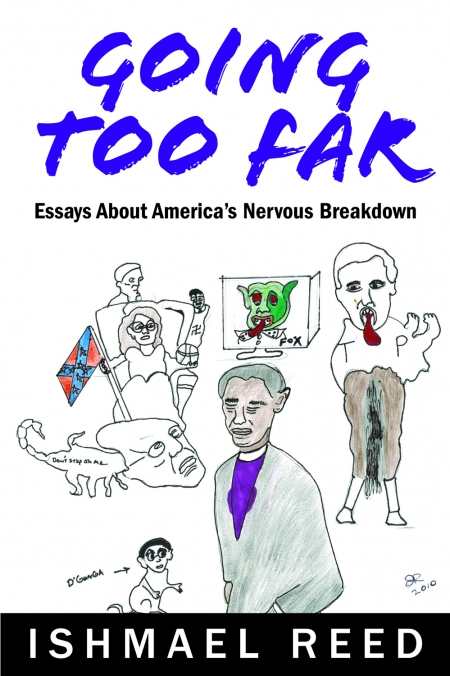Going Too Far
Essays about America's Nervous Breakdown
In his eleventh book of nonfiction, MacArthur Fellowship winner and media critic Ishmael Reed unleashes a fiery storm of criticism with a frenetic energy especially suited for to a critique that says our media culture has lost its mind. Going Too Far is a no-holds-barred grappling with racism in politics and its media coverage as well as in the culture and aesthetics of entertainment media. “When they tell me ‘don’t go there’ that’s my signal to navigate the forbidden topics of American life,” Reed says, and then dives in.
This three-part collection of previously published essays, combined with interviews and a political sketch, begins with an attack on the Tea Party, whose representatives “didn’t go to Washington to insist upon fiscal responsibility, but to destroy the first black president.” He argues that the movement is “racist … in which Holocaust deniers, Neo-Nazis and Neo-Confederates play a prominent role.” In “What Progressives Don’t Understand about Obama,” Reed lambasts white progressives for their complaints of the President—critiques, he suggests, that demonstrate ignorance about the history of racism toward blacks.
If politics is white separatist, then so is the American literary scene and entertainment media. “The Selling of Precious” is an exposé on the white influence and white—not black—audiences that praise the movie, which “includes the worst portrayal of black women” Reed has ever seen. “The Wire Goes to College” argues that the TV show is propaganda, portraying drug activity almost only among blacks. The Help, much lauded by movie-goers and critics, also fits the template Reed says is greedily consumed by white audiences: “saintly martyred black women … surrounded by evil black men.”
Finally, the compilation of essays concludes with interviews conducted by Reed (with Lou Gossett, Jr., David Murray, and Nuruddin Farrah) as well as interviews in which Reed and his opinions are the subject. While the themes are diverse, their commonality lies in an exploration of black experience in culture, arts, and politics.
While the criticisms Reed makes throughout are compelling, the revised essays at times read disjointedly, and a reader will want for more than a baseline knowledge of the worlds of politics, history, punditry, black literary writing, and Hollywood in order to make sense of the name-dropping that occurs throughout. Reed’s judgmental tone, perhaps fitting for the subject of “America’s Nervous Breakdown,” at times risks alienating readers instead of establishing a rapport with them.
Reviewed by
Heather Weber
Disclosure: This article is not an endorsement, but a review. The publisher of this book provided free copies of the book to have their book reviewed by a professional reviewer. No fee was paid by the publisher for this review. Foreword Reviews only recommends books that we love. Foreword Magazine, Inc. is disclosing this in accordance with the Federal Trade Commission’s 16 CFR, Part 255.

